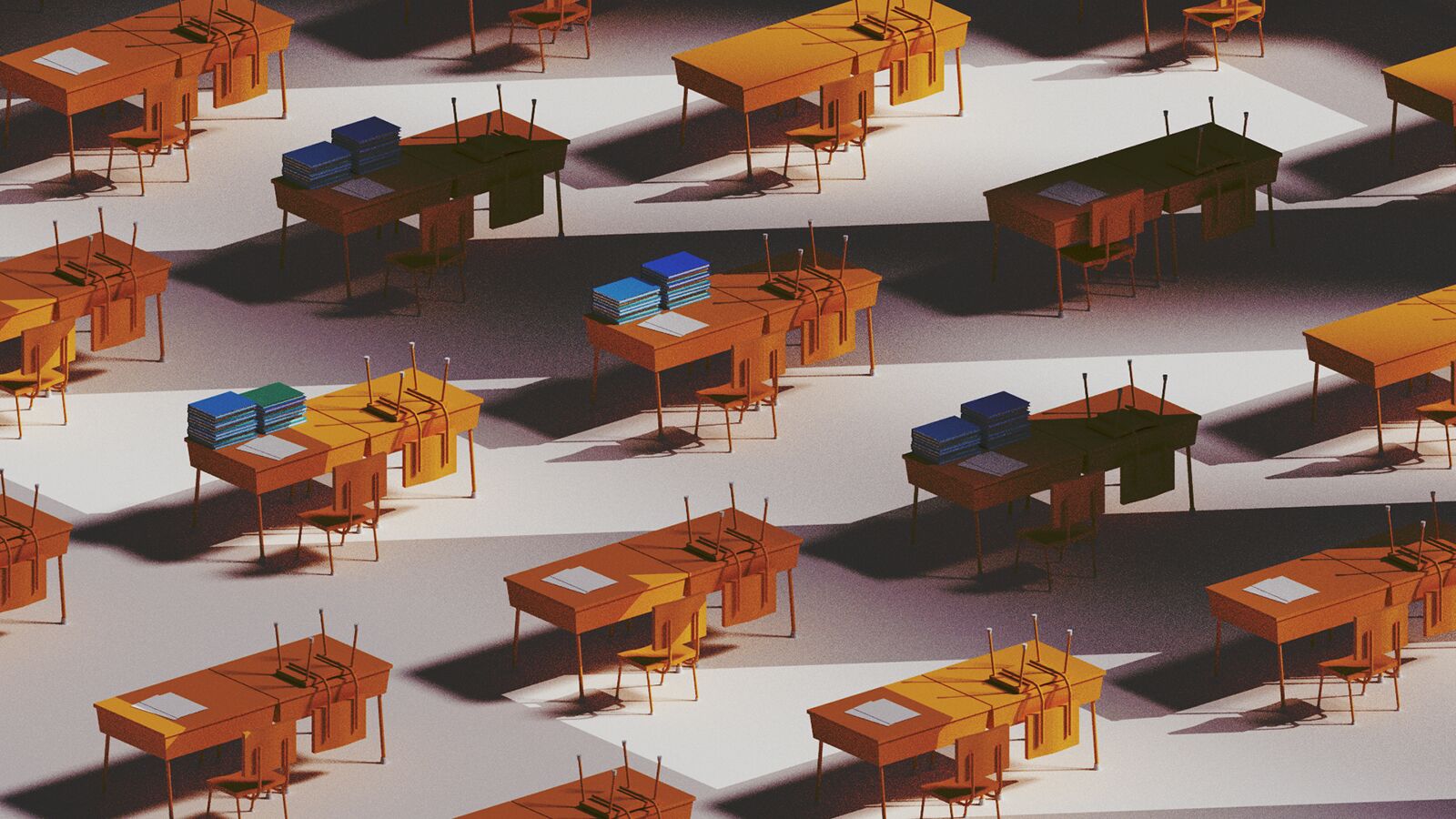
Born around the time of the 2003 SARS epidemic, China’s high school seniors are currently preparing for the most important test of their lives under extraordinary circumstances.

On a recent day in Wuhan, in a scene that could have been from any day in the past eight weeks, 43-year-old Song and her son were at home staring at their mobile phones. Song was trying to join a group food order in her community’s WeChat group, while her son, a high school senior, was taking classes online.
“Mom, can you buy some eye drops online? My eyes hurt,” her son shouted during a break, after six hours of continuous study.
“Look out of the window, rest your eyes,” Song replied. She saw him stretching with his eyes closed, frowning. It made her nervous.
The last time she had felt this nervous was 17 years ago, when she was pregnant with him during the SARS outbreak.
“People on Weibo say that my son’s generation is really unlucky,” Song later tells me. “Well, they have a point.”
The COVID-19 pandemic has changed everything about how people go about their lives, especially in Wuhan, the epicenter of the disease, a city that has been locked down since January 23 and will remain so for two more weeks.
But for those like Song’s son, who were born during SARS, COVID-19 has wreaked havoc on them in another specific, personal way: It has disrupted their preparation for the most important event of their lives, the gāokǎo 高考, China’s national college entrance exam. Taken every June by nearly 10 million students competing for 7 million university spots, this test is widely believed to determine the future of nearly every high school senior in China.
“There’s nothing we can do to change the situation,” Song said. “[My son] has to face the challenge and the pressure. I pray, and I believe, that when this is over, he will become a stronger man.”
UPDATE: The Ministry of Education announced on March 31 that the gaokao has been rescheduled to July 7-8, and that Hubei Province and Beijing are allowed propose their own schedule.
“We weren’t prepared for this”
When the Wuhan government abruptly announced the city’s lockdown on January 23, Li, a 53-year-old high school history teacher, was at home with his family ready to celebrate Chinese New Year.
About a week later, Li was informed that his school would remain closed indefinitely, and all gaokao preparation would take place online starting February 10. For Li, there was one big issue — he didn’t have any of his teaching materials at home, and his request to retrieve them from his office was denied.
“I mean, the bullet points of key information I’ve summarized, the examples from past years’ exams I’ve gathered, the mock tests I’ve prepared…all gone,” Li said. “How am I going to redo all of those in 10 days?”
His students are among the top students at his school. He knows how hard they’ve worked — in a sense, Chinese students prepare for the gaokao their entire lives, with their senior years filled with test-prep classes and cram sessions — and he was terrified of slowing them down.
He started to stay up late, gathering and organizing information he found online. “I’m worried about his own health,” Li’s wife said. “He’s not young, and there’s this deadly virus out there.”
A great number of teachers are in a similar situation. Online learning during COVID-19 has, in theory, democratized pedagogy, but in practice, it hasn’t been without problems. One Wuhan high school senior said that her chemistry teacher once gave a 45-minute lecture while muted. “Everyone was messaging him, but he was too focused on the lecture,” she said, laughing.
“We weren’t prepared for this, but I’m really trying my best,” the chemistry teacher said.
Besides technology issues, teachers also find it extremely hard to track students’ progress. Liu is the head teacher of a high school senior class in Wuhan. His day starts at 7:40 a.m., when his students begin to check in. Starting from 8, Liu will message all students who haven’t checked in, and their parents. “I’m on tenterhooks before I know for sure that everyone is healthy and no one is missing the class,” he said.
Throughout the day, Liu will constantly enter the online classroom to see if the students are interacting with their teachers. He will chat with students individually to check on their studies and lives, and give pep talks.
“I’m on my phone all day. My workload is heavier than ever,” Liu said.
Separated, but still together
“When do you think we can go back to school? I’ve never wanted to go to school so badly,” a student asked Liu during their private chat.
Born in the digital era, most high school seniors are familiar with studying online. But what they’re missing is the camaraderie of fellow students at school.
Studying for gaokao can be a lonely existence. High school seniors are under tremendous pressure for the entire year. Knowing they’re not alone, and being able to see and talk to their peers, is an important source of encouragement and motivation.
“Being separated with my classmates is driving me crazy,” one Wuhan high school senior said. “I feel like they’re all studying harder than me, and I worry I might have missed something important. That kind of thought sometimes keeps me up all night.”
Her classmate, Zhou, felt the same. She started a group chat for her classmates. Every day at 10:30 p.m., they gather in the group chat to talk about their days before going to bed.
“I can’t focus at home. I can’t control myself. What is happening to me? I’m gonna mess it all up,” a student broke down one day in the group chat.
Her classmates followed with a flurry of responses to cheer her up and give her encouragement.
“It’s okay! I get distracted by food and other things on my computer all the time,” Zhou replied. “That happens. You just need to adjust yourself. We can do this!”
“Thanks, guys,” the girl replied later. “I feel like we’re still together, just in a different way. This is going to be a very special gaokao for us.”
Parents’ worst fears
Hu is a nurse who has been fighting the virus on the frontlines since the beginning. She can only manage to make one phone call back home every day, usually around 11 p.m., near the end of the disinfection process. “I want to be with my son more than anything else in the world,” she said, her voice trembling. “I want to watch him going through this important journey of his life, and to give him the support he needs, but I can’t.”
Wang, a community worker who is in charge of the daily needs of about 500 households, shared a similar feeling. Her son is an art student, and his grades are far from satisfactory. So far, Wang’s husband has caught their son sleeping during online classes twice.
“Online preparation clearly does not work for students like my son,” Wang said. “If the quarantine continues to April, I fear that my son won’t be able to pass. And he won’t be able to retake the exam next year. What is he gonna do with his life?”
In Wuhan, this year’s gaokao will be the last one that separates students into liberal arts and science tracks. This means that if students choose to retake the gaokao next year, they will need to study the other three subjects outside of their track, starting from Grade 1, which “would be very difficult,” as many teachers have said.
Moreover, many art schools’ entrance exams, which take place in February and March and are separate from the gaokao, have been cancelled or postponed. Some schools, like the Central Academy of Drama, have announced that they will admit students according to their gaokao scores. Others have rolled out online entrance exams. “Now, my son will probably go for the safest [test], instead of his dream school,” Wang said.
Like Wang’s son, Qi’s daughter is also troubled by postponed exams. She is applying for colleges in the US, but all SAT exams have been cancelled or postponed.
“Even if those exams are reopened, would we be able to go there to take them?” Qi asked, considering the SATs can’t be taken in mainland China. Many countries have travel bans in place. Because of the growing frequency of discrimination against Chinese people in the news recently, Qi is even rethinking about whether she should let her daughter study abroad.
But she hasn’t discussed this yet with her daughter. “It’s pointless to talk about it,” she said. “Let’s first survive the coronavirus. Health is more important than anything.”






